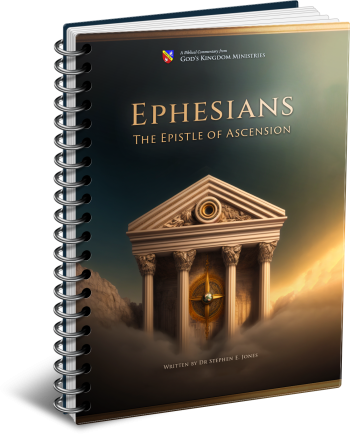Latest Posts
View the latest posts in an easy-to-read list format, with filtering options.

Paul's epistle to the Ephesians is, in some ways, a continuation of his epistle to the Romans. It enlarges upon Romans 1-8 in regard to the believer's position and right standing with God. We are "seated" with Christ, so we must "walk" according to our calling, and "stand" in the full armor of God against those who would oppose us.
Category - Bible Commentaries

In regard to spiritual armor, Paul writes in Eph. 6:15,
15 and having shod your feet with the preparation of the gospel of peace.
This word picture shows someone who is being sent out with the message of “the gospel of peace.” He prepares for his journey first by putting on his shoes, so that the rough road does not slow him down or injure his feet. This is the only piece of armor that is said to prepare the ambassador for his journey.
He is indeed an ambassador carrying a message from God. 2 Cor. 5:18-20 says,
18 Now all these things are of God, who reconciled us to Himself through Christ and gave us the ministry of reconciliation, 19 namely, that God was in Christ reconciling the world to Himself, not counting their trespasses against them, and He has committed to us the word of reconciliation. 20 Therefore, we are ambassadors for Christ, as though God were making an appeal through us; we beg you on behalf of Christ, be reconciled to God.
The message committed to us is “the word of reconciliation,” which is said to be “that God was in Christ reconciling the world to Himself.” The Greek word translated “reconciliation” is katallasso, which means literally, “to change or exchange, to cause one thing to cease and another to take its place.”
The word was used in commerce to exchange coins or to make an equal exchange (coins for goods being purchased or bartered to the satisfaction and agreement of both parties).
The “word of reconciliation,” then, is an exchange where Christ purchased the world by His blood. His blood was given in exchange. Though His blood was worth far more than the entire debt of the world through all of history, He was willing to make that exchange.
In order to understand the precise nature of the word of reconciliation given to the ambassadors of Christ, we must compare katallasso with apokatallasso, a word that Paul used earlier in Eph. 2:15, 16,
15 … so that in Himself He might make the two into one new man, thus establishing peace, 16 and might reconcile [apokatallasso] them both in one body to God through the cross, by it having put to death the enmity.
Most translators make no distinction between katallasso and apokatallasso, because they fail to recognize the precise nature of this transaction. Neither do they acknowledge Paul’s clear teaching on the reconciliation of all things (Col. 1:20). Katallasso is the appropriate word to picture God sending out an emissary to an enemy, telling him that the war is over and that God is no longer fighting them, that God is “not counting their trespasses against them.”
In other words, the entire world has fallen into sin, violating God’s rights. God has legal cause against their offensive behavior, but the blood of Jesus has paid the debt and satisfied His demands. Hence, God is no longer fighting them, nor does He consider them to be His enemies any longer. God then sends ambassadors to tell these former enemies that for His part, He has been conciliated (katallasso). The point of the message is to ask the other side to accept this conciliation, so that there can be a reconciliation (apokatallasso) of both parties.
God took the initiative and conciliated the world even before the world had time to respond in kind. Paul shows the same idea in Rom. 5:10, where he says,
10 For if while we were enemies we were reconciled [katallasso] to God through the death of His son, much more having been reconciled [katallasso], we shall be saved by His life.
Note that this describes a situation where God has conciliated them while they are still enemies. It is only when those enemies become God’s friends that a reconciliation (apokatallasso) takes place. Hence, ambassadors for Christ are sent out with a message of conciliation, asking for a conciliatory response so that there may be a reconciliation.
The ambassadors prepare for their peace mission by putting on their spiritual shoes. The purpose of reconciliation is to establish peace. Peace is about reconciliation. The peace offerings in the law (Leviticus 3) were designed to teach us the importance of God’s plan to reconcile enemies, just as the sin offerings were designed to teach us how to justify sinners.
Both justification and reconciliation are linked to the love of God in Rom. 5:8-10, which is the prelude to Paul’s discussion about its universal application in Rom. 5:16-19. Unless ambassadors for Christ clearly understand the word of reconciliation which they must convey to the world, how is it possible to fulfill that calling? Virtually all believers understand the message of justification, but how many understand the word of reconciliation?
So let us put on our spiritual shoes and thereby fulfill our call as ambassadors of Christ. Only by wearing those shoes can we fulfill the prophecy in Isaiah 52:7,
7 How lovely on the mountains [i.e., the nations] are the feet of him who brings good news [basar, “gospel”], who announces peace and brings good news [basar] of happiness, who announces salvation [yeshua], and says to Zion, “Your God reigns!”
We read about the shield of faith in Eph. 6:16,
16 in addition to you all, taking up the shield of faith with which you will be able to extinguish all the flaming arrows of the evil one.
A shield is not part of our body armor as such, so we see no counterpart in the priestly garments in Leviticus 8. Nonetheless, as we will see shortly, the faith of the priests served as their shield. Faith comes through hearing (Rom. 10:17), and the priests were required to hear God’s voice in order to function as intercessors and to “war the warfare” on behalf of the people.
Paul likens faith to a shield against demonic enemy attacks. As I have said many times already, faith that imputes righteousness to a believer is the type that is of the quality of Abraham’s faith. It is New Covenant faith in God’s promise, as opposed to Old Covenant faith in man’s promise.
Most “flaming arrows” (NASB) or “fiery darts” (KJV) are made of guilt and fear. An arrow of guilt uses our imperfections and past sins against us, as if we have not been fully forgiven and cleansed by the blood of Jesus. An arrow of fear tries to tell us that the devil is more powerful than God and that God has abandoned us. These arrows bounce off a sturdy shield of faith, doing no harm.
We utilize our shield of faith by reminding the devil (and ourselves) that we believe the promise of God and have entered “His oath” (Deut. 29:12) which He will surely keep. Likewise, when God told Abraham, “Do not fear, for I am with you” (Gen. 26:24), it was spoken not only to him but to all of his children—all those who have Abrahamic faith. Heb. 13:5, 6 says,
5 … for He Himself has said, “I will never desert you, nor will I ever forsake you,” 6 so that we confidently say, “The Lord is my helper, I will not be afraid. What will man do to me?”
We respond to the voice of God and the oath that He swore; we do not react to the accusations or threats of the devil, except to refute them and to raise our shield of faith against flaming arrows.
Many years ago, as I was first learning to hear His voice, I faced opposition, and so I asked God to strengthen my shield so that I might withstand the fiery darts of the devil. He responded by telling me to look up Psalm 47:9. I did so, and read,
9 The princes of the people have assembled themselves as the people of the God of Abraham, for the shields of the earth belong to God; He is highly exalted.
In other words, He reminded me that spiritual armor, including shields, belong to Him. We just need to exchange our fleshly armor for the armor of God. God’s “shield of faith” is based on His faithfulness, not on our own attempts to be faithful to God. We see this in Psalm 91:4,
4 He will cover you with His pinions, and under His wings you may seek refuge; His faithfulness [or “Truth,” KJV] is a shield and bulwark.
In other words, what we may picture as a piece of Roman armor is actually God’s “wings” and “pinions” (or feathers).
A minister named William Cushing wrote a song over a century ago called Under His Wings. In it, he wrote,
Verse 1:
Under His wings I am safely abiding;
Though the night deepens and tempests are wild,
Still I can trust Him—I know He will keep me,
He has redeemed me, and I am His child.
Refrain:
Under His wings, under His wings,
Who from His love can sever?
Under His wings my soul shall abide,
Safely abide forever.
When Cushing was still in his 50’s, he developed a creeping paralysis that gradually caused him to lose his voice. That, of course, was disastrous for a preacher. Yet he was always mindful of the suffering of others, though oblivious to his own. He once gave his entire savings ($1000) to fund the education of a blind girl. After retiring, he asked God to give him something to do. He discovered that he had a talent for writing and soon wrote about 300 lyrics to be sung as hymns.
One of those hymns was Under His Wings. Though few churches sing his hymn anymore, it was a meaningful song that spoke of his shield of faith.
When faith (Hebrew: emun) is extended over time, it is called faithfulness (emuna, as in Hab. 2:4). A faithful believer is one whose faith endures, because it is based on the knowledge that God is able. Rom. 3:26, 27 focuses on the idea of faith itself, while Heb. 10:36 focuses on the need for endurance—that is, enduring faith, or faithfulness.
Our New Covenant shield of faith also means that we are shielded by truth, because “faith” (emun) and “truth” (emet) share a common root word (aman) in the Hebrew language. Hence, faith must be rooted in truth, or else our faith is misplaced.
Whenever we say “Amen” at the close of a prayer, we declare that we bear witness to the truth being prayed. Amen means “Verily, of a truth.” When we bear witness, we do so by faith, because faith comes by hearing the truth (Rom. 10:17). That is why truth and faith come from the same Hebrew root word, aman.
This connects our shield of faith with our belt of truth, as well as our breastplate of righteousness, which is imputed to us by faith. There is a common thread that connects each piece of spiritual armor to the others.